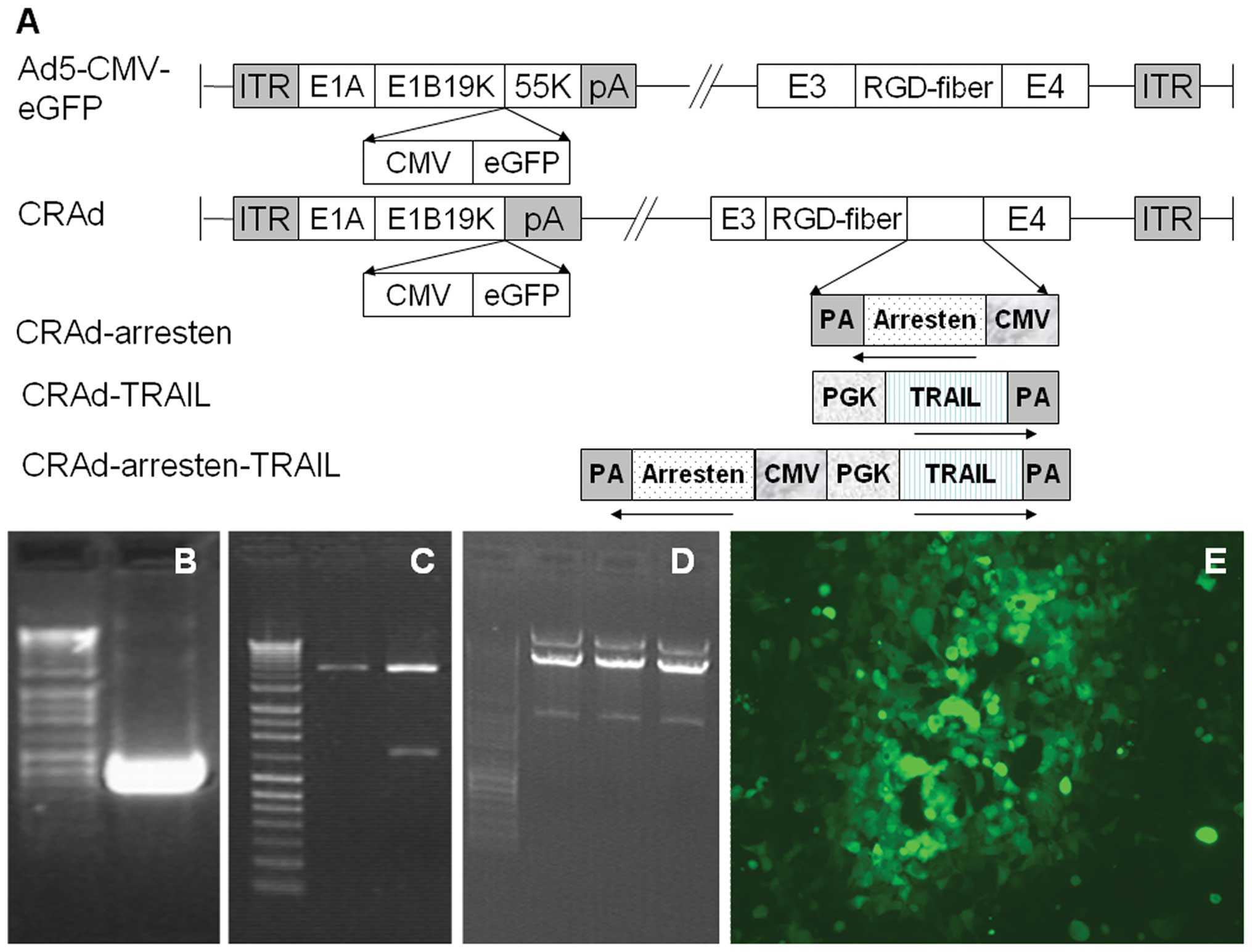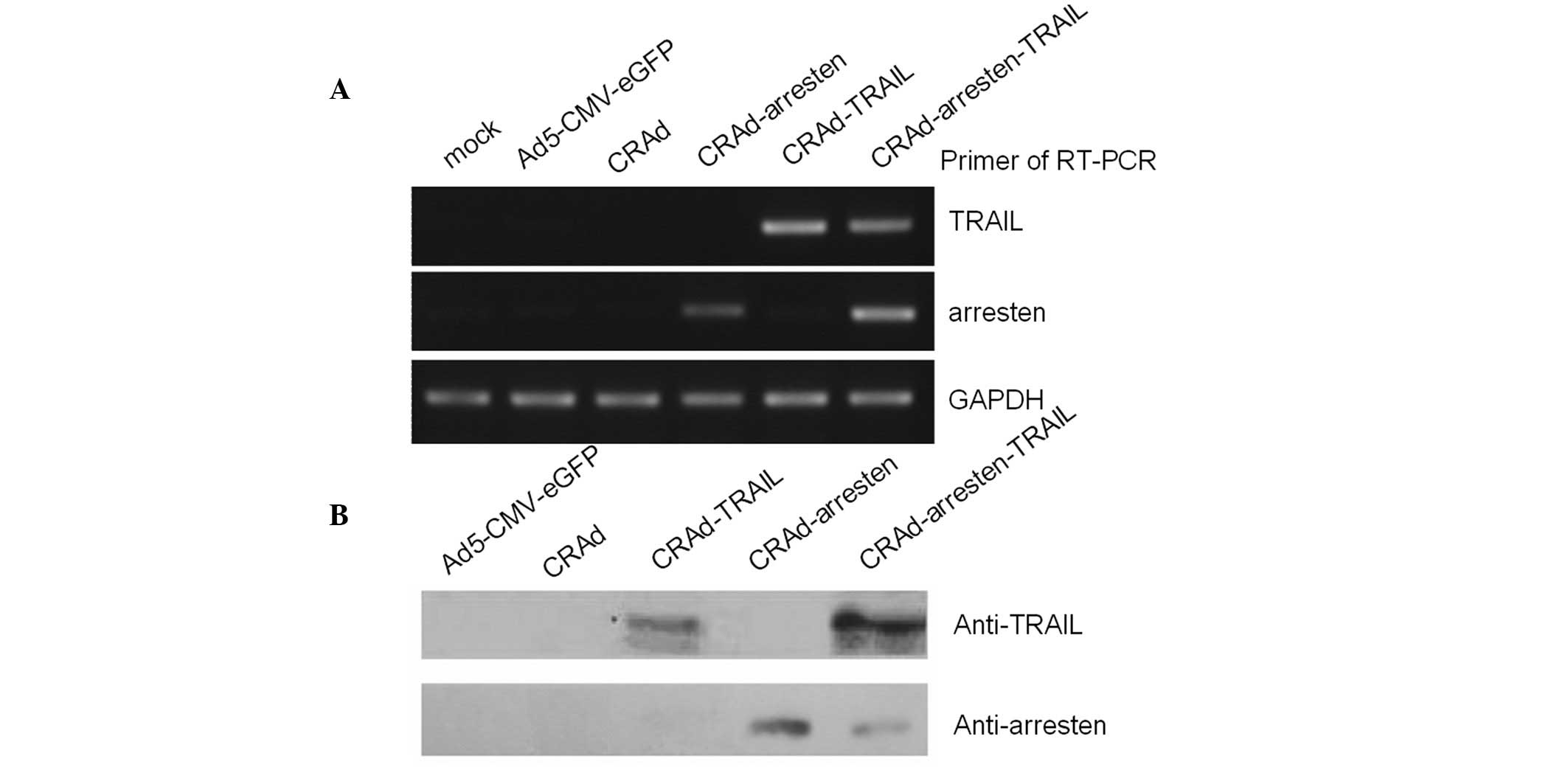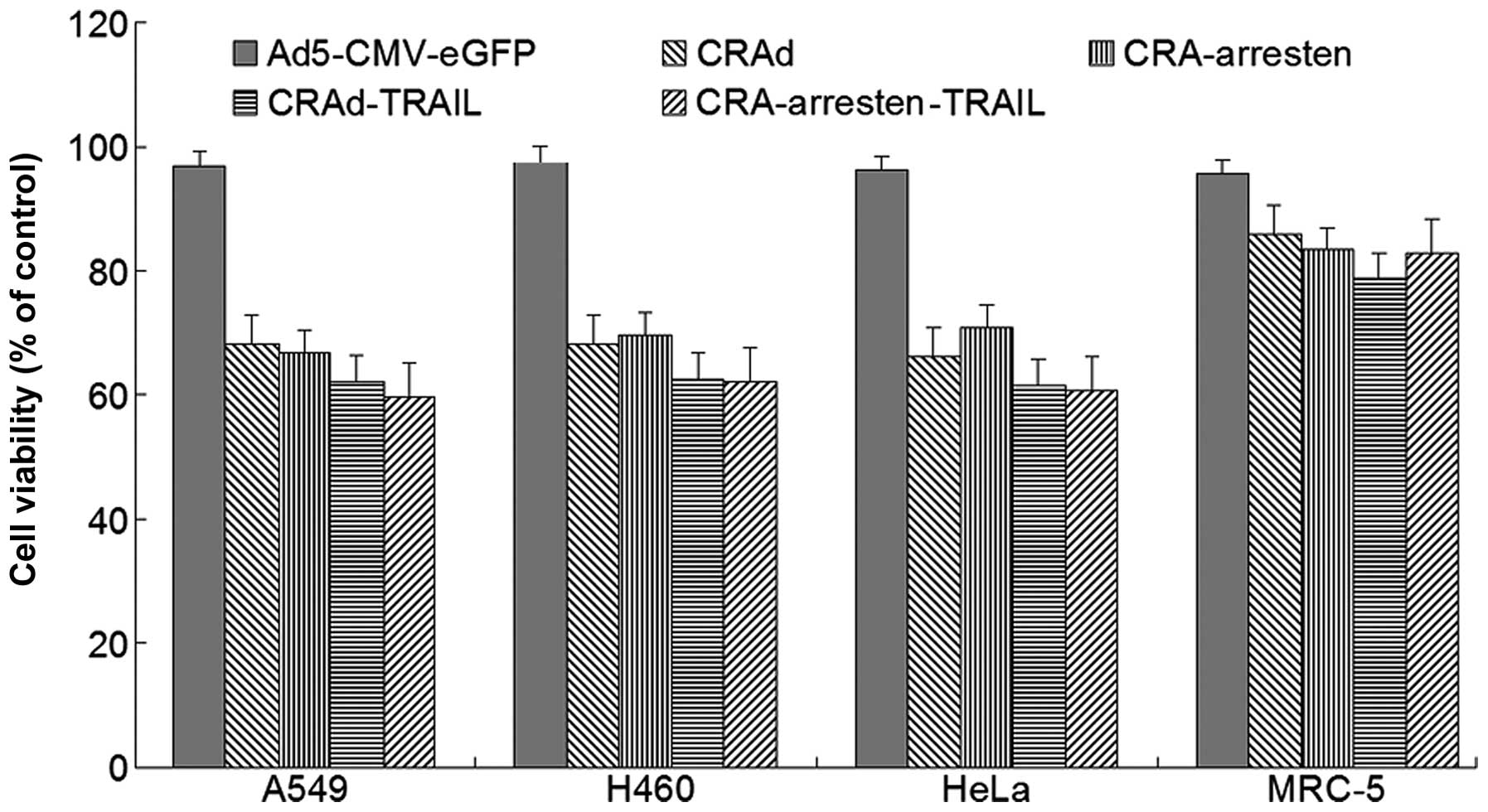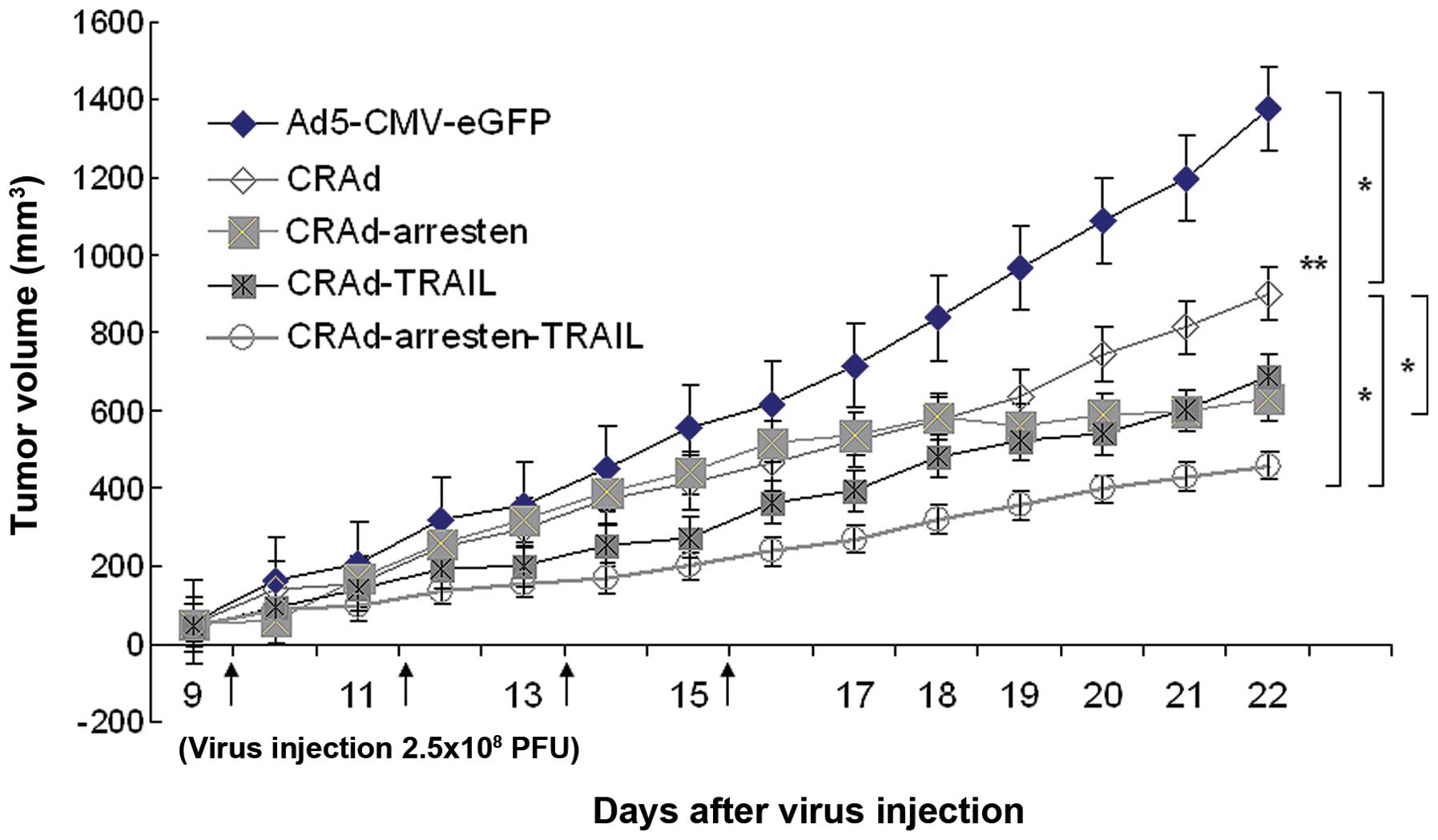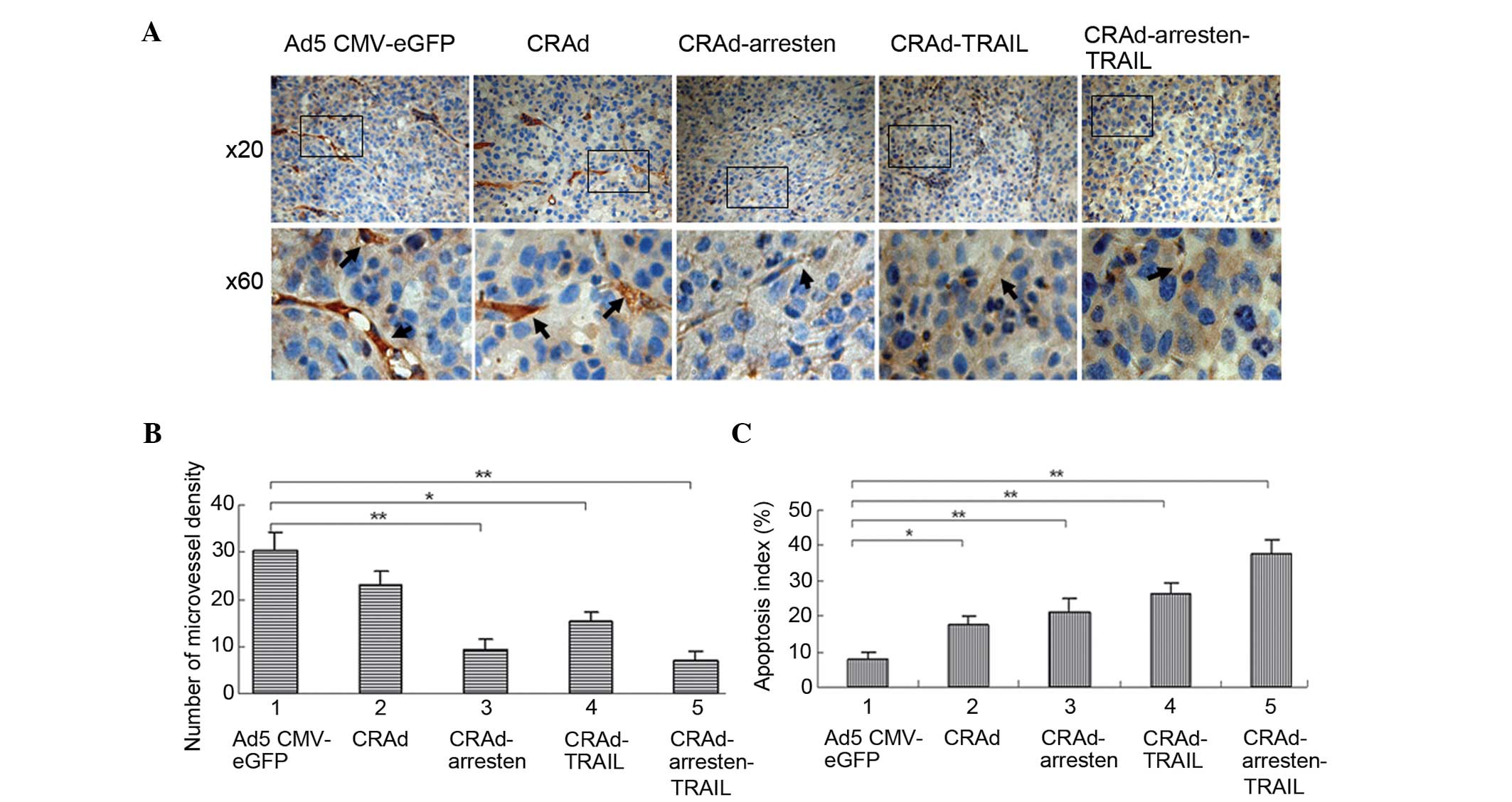|
1
|
Chen W, Zheng R, Zhang S, Zou X, Zhao P
and He J: Lung cancer incidence and mortality in China, 2009.
Thoracic Cancer. 4:102–108. 2013. View Article : Google Scholar
|
|
2
|
Parkin DM, Bray FI and Devesa SS: Cancer
burden in the year 2000. The global picture. Eur J Cancer. 37(Suppl
8): S4–S66. 2001. View Article : Google Scholar : PubMed/NCBI
|
|
3
|
Ghosh SS, Gopinath P and Ramesh A:
Adenoviral vectors: a promising tool for gene therapy. Appl Biochem
Biotechnol. 133:9–29. 2006. View Article : Google Scholar : PubMed/NCBI
|
|
4
|
Rein DT, Breidenbach M and Curiel DT:
Current developments in adenovirus-based cancer gene therapy.
Future Oncol. 2:137–143. 2006. View Article : Google Scholar : PubMed/NCBI
|
|
5
|
Jounaidi Y, Doloff JC and Waxman DJ:
Conditionally replicating adenoviruses for cancer treatment. Curr
Cancer Drug Targets. 7:285–301. 2007. View Article : Google Scholar : PubMed/NCBI
|
|
6
|
Bilsland AE, Merron A, Vassaux G and Keith
WN: Modulation of telomerase promoter tumor selectivity in the
context of oncolytic adenoviruses. Cancer Res. 67:1299–1307. 2007.
View Article : Google Scholar : PubMed/NCBI
|
|
7
|
Lanson NA Jr, Friedlander PL,
Schwarzenberger P, et al: Replication of an adenoviral vector
controlled by the human telomerase reverse transcriptase promoter
causes tumor-selective tumor lysis. Cancer Res. 63:7936–7941.
2003.PubMed/NCBI
|
|
8
|
Haviv YS: A simplified in vitro ligation
approach to clone an E1B55k-deleted double-targeted
conditionally-replicative adenovirus. Virol J. 6:182009. View Article : Google Scholar : PubMed/NCBI
|
|
9
|
Chen MJ, Green NK, Reynolds GM, et al:
Enhanced efficacy of Escherichia coli nitroreductase/CB1954 prodrug
activation gene therapy using an E1B-55K-deleted oncolytic
adenovirus vector. Gene Ther. 11:1126–1136. 2004. View Article : Google Scholar : PubMed/NCBI
|
|
10
|
Graat HC, van Beusechem VM, Schagen FH, et
al: Intravenous administration of the conditionally replicative
adenovirus Ad5-Delta24RGD induces regression of osteosarcoma lung
metastases. Mol Cancer. 7:92008. View Article : Google Scholar : PubMed/NCBI
|
|
11
|
Lamfers M, Idema S, Bosscher L, et al:
Differential effects of combined Ad5- delta 24RGD and radiation
therapy in in vitro versus in vivo models of malignant glioma. Clin
Cancer Res. 13:7451–7458. 2007. View Article : Google Scholar : PubMed/NCBI
|
|
12
|
Ries S and Korn WM: ONYX-015: mechanism of
action and clinical potential of replication-selective adenovirus.
Br J Cancer. 86:5–11. 2002. View Article : Google Scholar : PubMed/NCBI
|
|
13
|
Heise C and Kirn DH: Replication-selective
adenoviruses as oncolytic agents. J Clin Invest. 105:847–851. 2000.
View Article : Google Scholar : PubMed/NCBI
|
|
14
|
Brown CB and Bell JC: Oncolytic viruses: A
new weapon to fight cancer. J Med Imag Rad Sci. 39:115–127. 2008.
View Article : Google Scholar
|
|
15
|
Vähä-Koskela MJ, Heikkilä JE and Hinkkanen
AE: Oncolytic viruses in cancer therapy. Cancer Lett. 254:178–216.
2007. View Article : Google Scholar : PubMed/NCBI
|
|
16
|
He XP, Su CQ, Wang XH, et al:
E1B-55kDa-deleted oncolytic adenovirus armed with canstatin gene
yields an enhanced anti-tumor efficacy on pancreatic cancer. Cancer
Lett. 285:89–98. 2009. View Article : Google Scholar : PubMed/NCBI
|
|
17
|
Fan JK, Xiao T, Gu JF, et al: Increased
suppression of oncolytic adenovirus carrying mutant k5 on
colorectal tumor. Biochemical Biophys Res Commun. 374:198–203.
2008. View Article : Google Scholar
|
|
18
|
Sudhakar A, Nyberg P, Keshamouni VG, et
al: Human alpha1 type IV collagen NC1 domain exhibits distinct
antiangiogenic activity mediated by alpha1beta1 integrin. J Clin
Invest. 115:2801–2810. 2005. View
Article : Google Scholar : PubMed/NCBI
|
|
19
|
Chai L, Liu S, Mao Q, Wang D, Li X, Zheng
X and Xia H: A novel conditionally replicating adenoviral vector
with dual expression of IL-24 and arresten inserted in E1 and the
region between E4 and fiber for improved melanoma therapy. Cancer
Gene Ther. 19:247–254. 2012. View Article : Google Scholar
|
|
20
|
National Research Council of The National
Academies: Guide for the care and use of laboratory animals. 8th
edition. The National Academies Press; Washington, DC: 2011
|
|
21
|
Li X, Mao QW, Wang DY, Zhang WF and Xia
HB: A fiber chimeric CRAd vector Ad5/11-D24 double-armed with TRAIL
and arresten for enhanced glioblastoma. Hum Gene Ther. 23:589–596.
2012. View Article : Google Scholar
|
|
22
|
Kim DR, Park MY, Lee CS, et al:
Combination of vorinostat and adenovirus-TRAIL exhibits a
synergistic antitumor effect by increasing transduction and
transcription of TRAIL in lung cancer cells. Cancer Gene Ther.
18:467–477. 2011. View Article : Google Scholar : PubMed/NCBI
|
|
23
|
Zhang H, Sui A, Wang Z, Liu S and Yao R:
Adenovirus-mediated TRAIL expression and downregulation of Bcl-2
expression suppresses non-small cell lung cancer growth in vitro
and in vivo. Int J Mol Med. 30:358–364. 2012.PubMed/NCBI
|
|
24
|
Holoch PA and Griffith TS: TNF-related
apoptosis-inducing ligand (TRAIL): a new path to anti-cancer
therapies. Eur J Pharmacol. 625:63–72. 2009. View Article : Google Scholar : PubMed/NCBI
|
|
25
|
Kim CY, Park SH, Jeong M, et al:
Preclinical studies for pharmacokinetics and biodistribution of
Ad-stTRAIL, an adenovirus delivering secretable trimeric TRAIL for
gene therapy. Exp Mol Med. 43:580–586. 2011. View Article : Google Scholar : PubMed/NCBI
|
|
26
|
Colorado PC, Torre A, Kamphaus G, et al:
Anti-angiogenic cues from vascular basement membrane collagen.
Cancer Res. 60:2520–2526. 2000.PubMed/NCBI
|
|
27
|
Aikio M, Alahuhta I, Nurmenniemi S, et al:
Arresten, a collagen-derived angiogenesis inhibitor, suppresses
invasion of squamous cell carcinoma. PLoS One. 7:e510442012.
View Article : Google Scholar : PubMed/NCBI
|
|
28
|
Boosani CS, Nalabothula N, Munugalavadla
V, et al: FAK and p38-MAP kinase-dependent activation of apoptosis
and caspase-3 in retinal endothelial cells by alpha1(IVC1. Invest
Ophthalmol Vis Sci. 50:4567–4575. 2009. View Article : Google Scholar : PubMed/NCBI
|
|
29
|
Assadian S, El-Assaad W, Wang XQ, et al:
p53 inhibits angiogenesis by inducing the production of Arresten.
Cancer Res. 72:1270–1279. 2012. View Article : Google Scholar : PubMed/NCBI
|















